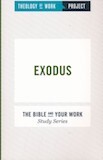God Calls Us: Exodus 3 Sermon Notes
Sermon Notes / Produced by The High Calling
Exodus 3:1-12
Moses was keeping the flock of his father-in-law Jethro, the priest of Midian; he led his flock beyond
the wilderness, and came to Horeb, the mountain of God. There the angel of the Lord appeared to
him in a flame of fire out of a bush; he looked, and the bush was blazing, yet it was not consumed.
Then Moses said, “I must turn aside and look at this great sight, and see why the bush is not burned
up.” When the Lord saw that he had turned aside to see, God called to him out of the bush, “Moses,
Moses!” And he said, “Here I am.” Then he said, “Come no closer! Remove the sandals from your
feet, for the place on which you are standing is holy ground.” He said further, “I am the God of your
father, the God of Abraham, the God of Isaac, and the God of Jacob.” And Moses hid his face, for
he was afraid to look at God.
Then the Lord said, “I have observed the misery of my people who are in Egypt; I have heard their
cry on account of their taskmasters. Indeed, I know their sufferings, and I have come down to
deliver them from the Egyptians, and to bring them up out of that land to a good and broad land, a
land flowing with milk and honey, to the country of the Canaanites, the Hittites, the Amorites, the
Perizzites, the Hivites, and the Jebusites. The cry of the Israelites has now come to me; I have also
seen how the Egyptians oppress them. So come, I will send you to Pharaoh to bring my people, the
Israelites, out of Egypt.” But Moses said to God, “Who am I that I should go to Pharaoh, and bring
the Israelites out of Egypt?” He said, “I will be with you; and this shall be the sign for you that it
is I who sent you: when you have brought the people out of Egypt, you shall worship God on this
mountain.”
Theological Point: God speaks into our ordinary lives, transforms everything by his presence, and calls us to
do his healing and liberating work in the world.
Introduction: Moses was herding ordinary sheep on an ordinary day in the wilderness of Sinai. There was
a bush—an ordinary, scrubby bush. Suddenly the holy happened. Everything was transformed. Nothing in
Moses’ life was ever the same again.
The opening of a sermon on this story could be as simple as the above five sentences. The preacher could
then tell the story by vividly describing the scene in more detail: the barren wasteland of Sinai; the dark,
foreboding mountain; the flame of fire from the bush; Moses turning aside to look, then taking off his
sandals; and the Voice calling out to him: “Come, I will send you to bring my people out of Egypt.”
The story is about calling and vocation. It’s about the extraordinary breaking into the ordinary. It’s about
hearing and responding to the call of God in our lives. Old Testament scholar Walter Brueggemann says of
the story, “Moses had his ordinariness broken. He had to rethink the faith and the life of his people. Moses
discovered that his life was saturated with the reality of God. . . . And he wondered: What could be different
about the purpose of my life because of the reality of this God?” (The Threat of Life: Sermons on Pain,
Power, and Weakness, Fortress, 1996, p. 23).
Calling, vocation, purpose. Another way to begin this sermon might be to tell a story of one’s own
experience of the call of God. Or one might tell of a simple experience of the awareness of the presence of
God—a sacred or holy moment, no matter how small. Here’s an example:
My wife Debra and I were sitting on a park bench overlooking a small lake. We were having our morning
coffee and talking about the day ahead—the ordinary stuff of life. When our two daughters’ names came
up, Debra suddenly paused and got a faraway look in her eye. After a long silence she said: “My job
description as I’ve known it as a mother for the last twenty years is coming to an end. Soon I’ll no longer be
able to bury my face in the smell of their soft morning wake-up hair. I won’t be running last-minute things
up to the school anymore. They won’t come bounding in the door, full of life, at the end of the day. The
defining priorities of my life as a ‘mom’ will end. My world is about to be redefined. I don’t know what my
new job description is going to be.” Then with a tear in her eye she said, “There’s a loss in that.” Together
we sat in the silence of the morning sun, the wind on the water, the trees stirring in the breeze. Debra had
just named our new reality as empty nesters. In its own strange way, that moment became a sacred moment.
Something holy happened. In an ordinary conversation on an ordinary morning, we suddenly felt the
presence of God.
Telling that kind of story grounds the sermon in a modern-life experience with which everyone can identify.
As one then transitions to the story of Moses, the preacher’s own personal story serves as a backdrop to
help listeners identify with Moses’ story.
A. Holy Ground. When the holy happens, when we experience God’s presence, or God speaks to us, all is
transformed. “Come no closer! Remove the sandals from your feet, for the place on which you are standing
is holy ground” (v. 5).
Here the sermon might briefly explore the concept of “the holy” in ancient Israel. God’s holiness requires
respectful distance, but God’s presence also transforms everything at hand. The burning bush in the barren,
lonely desert of Sinai is a sign that God often comes and graces the lowly, appears in the common places of
life, and speaks a word. We can experience God’s presence anywhere, anytime, at work, school, home. God’s
presence happens to ordinary people going about their ordinary routines. So it’s important to be watching
and listening for those moments. This point is important in helping people avoid the common disconnect
between their faith and their daily life and work.
The words of Frederick Buechner come to mind: “Taking your children to school and kissing your wife
good-bye. Eating lunch with a friend. Trying to do a decent day’s work. Hearing the rain patter against
the window. There is no event so commonplace but that God is present within it, always hiddenly, always
leaving you room to recognize him or not to recognize him, but all the more fascinatingly because of that,
all the more compellingly and hauntingly. . . . Listen to your life. See it for the fathomless mystery that it is.
In the boredom and pain of it, no less than in the excitement and gladness—touch, taste, smell your way to
the holy and hidden heart of it—because in the last analysis, all moments are key moments, and life itself is
grace” (Now and Then, Harper & Row, 1983, p. 87).
B. God Calls Us. “I have seen the suffering of my people in Egypt; I have heard their cry; and I have come
down to deliver them. . . . So come, I will send you to Pharaoh to bring my people out of Egypt” (vv. 7-8,
10). God calls Moses to a task. There is work to be done. The call will change his life forever.
Here is an opportunity to reflect on the meaning of our work as calling and vocation. There is in the
Protestant tradition a rich body of reflection on this subject. Martin Luther saw all means of livelihood
and productive work, even the most mundane and unpleasant labor, as marks of Christian vocation and
response to God. John Calvin said that all our actions, not just our work, are a response to God’s calling.
Taken seriously, this means that our work and all we do in daily life are our vocation. All work given us by
God is therefore holy and is done as a service to God.
In our day, Parker Palmer has spoken of the importance of listening inwardly for the call of God: “Vocation
does not come from willfulness. It comes from listening. . . . Vocation does not mean a goal that I pursue. It
means a calling that I hear . . . It comes from a voice ‘in here’ calling me to be the person I was born to be,
to fulfill the original selfhood given me at birth by God” (Let Your Life Speak, Jossey-Bass, 2000, pp. 4, 10).
“So come, I will send you to bring my people out of Egypt.” Here the preacher might ask: So what is your
calling, your vocation? What is the work to which God calls you? Are you living out your calling? Some
writers suggest it is helpful to think in terms of our various or multiple callings in our work, relationships,
leisure, family, and community. So the question might also be: Are you living out your callings in your
different roles in life?
For the notion of multiple callings in life, see Douglas Schuurman’s book, Vocation: Discerning Our Callings
in Life (Eerdmans, 2004). Schuurman distinguishes the primary calling of all Christians to love God and
neighbor from the multiple particular callings in which we carry out the command to love.
The story of Moses invites us to take off our shoes and listen for the Voice of God’s call, God’s guidance,
and reassurance.
C. But Who Am I? Moses’ initial response to God was, “Who am I that I should go to Pharaoh, and bring
the Israelites out of Egypt?” (v. 11). What a human moment! The call was overwhelming and filled with risk.
Moses felt fearful and inadequate. He was reluctant to go. Don’t we all feel that way at one time or another?
Just as it isn’t always easy to hear God’s call in our lives, it isn’t easy to live out our call. But we don’t have to
do it on our own, nor can we.
Conclusion: I will be with you. The sermon might end with God’s response to Moses, “I will be with you”
(v. 12). While in the remainder of the story, Moses offered further objections to the divine call, eventually he went.
God’s “I will be with you” sustained him from the mud pits of Egypt all the way to Mt. Nebo. That
same promise of divine presence gives us hope in our journeys. Created, redeemed, and called by God, we
also are given the assurance of God’s presence and power every step of the way. And that makes all the
difference.
Connection to Faith and Daily Life: The story of God’s call in Moses’ life invites us to reflect on our own
calling and vocation. Our work and all we do in daily life are a response to God’s call. We discern our calling
and vocation by listening for God, and we are promised God’s presence as we live our call daily.
********************************************************************
These sermons are by The Rev. Dr. Gary Klingsporn, Senior Minister of First Congregational Church in Nantucket, Massachusetts. Before moving to Nantucket in January 2010, he previously served for twenty years as Teaching Minister and Minister of Spiritual Formation at Colonial Church in Edina, Minnesota. He has contributed many articles to www.TheHighCalling.org and has served as a seminary instructor and writer or editor on a number of publishing projects. He received a Ph.D. in Religious Studies from Baylor University (1985).
Click here for a PDF of this sermon.
Other sermons in this series:





